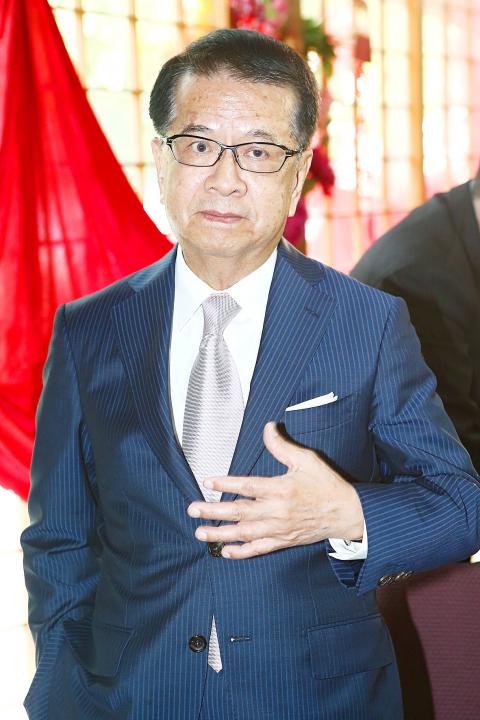Pxmart Co Ltd (全聯實業), which operates one of the nation’s largest supermarket chains, yesterday confirmed that company president Hsu Chung-jen (徐重仁) would retire in September.
Hsu — who has been in charge of Pxmart since 2014 — is to step down from the management team next month and officially retire by the end of September, the company said in a statement, citing personal career planning reasons.
Hsu, who has worked in the retail industry for more than 30 years, is also known for turning President Chain Store Corp (PCSC, 統一超商) into the nation’s largest convenience store chain operator, serving as its president prior to joining Pxmart.

Photo: Chen Yi-kuan, Taipei Times
Pxmart named CEO James Hsieh (謝健南) as president, saying he would lead its expansion plans.
Hsieh previously served as chief operating officer of PCSC and as CEO of Gourmet Master Co (美食達人), which operates popular cafe and bakery chain 85°C (85度C)
Hsu is stepping down because he and Pxmart chairman Lin Ming-hsiung (林敏雄) disagree about the company’s future plans, the Chinese-language Economic Daily News reported.
However, at a news conference yesterday, Hsieh denied the report, saying that Hsu had as early as last year decided to retire.
“The company’s long-term operations objective will not change, but we might take different measures [to achieve it],” Hsieh said.
Pxmart, which operates 910 outlets nationwide, said it aims to increase the number of its stores to 1,000 and boost annual sales from about NT$101 billion (US$3.33 billion) last year to more than NT$200 billion.
The company’s brand image has taken a beating since comments by Hsu about low salaries sparked a backlash among young people.
At a book launch in April, Hsu accused young people of “spending beyond their means on trips abroad and the latest mobile phones,” saying that the younger generation should endure low wages rather than complain.
He later apologized on Facebook after the company’s page was bombarded with irate messages from young people.
Pxmart last month apologized to film director Wu Nien-jen (吳念真), who complained on Facebook about the company’s use of his image in marketing materials without asking for his permission.

AGING: As of last month, people aged 65 or older accounted for 20.06 percent of the total population and the number of couples who got married fell by 18,685 from 2024 Taiwan has surpassed South Korea as the country least willing to have children, with an annual crude birthrate of 4.62 per 1,000 people, Ministry of the Interior data showed yesterday. The nation was previously ranked the second-lowest country in terms of total fertility rate, or the average number of children a woman has in her lifetime. However, South Korea’s fertility rate began to recover from 2023, with total fertility rate rising from 0.72 and estimated to reach 0.82 to 0.85 by last year, and the crude birthrate projected at 6.7 per 1,000 people. Japan’s crude birthrate was projected to fall below six,

Conflict with Taiwan could leave China with “massive economic disruption, catastrophic military losses, significant social unrest, and devastating sanctions,” a US think tank said in a report released on Monday. The German Marshall Fund released a report titled If China Attacks Taiwan: The Consequences for China of “Minor Conflict” and “Major War” Scenarios. The report details the “massive” economic, military, social and international costs to China in the event of a minor conflict or major war with Taiwan, estimating that the Chinese People’s Liberation Army (PLA) could sustain losses of more than half of its active-duty ground forces, including 100,000 troops. Understanding Chinese

US President Donald Trump in an interview with the New York Times published on Thursday said that “it’s up to” Chinese President Xi Jinping (習近平) what China does on Taiwan, but that he would be “very unhappy” with a change in the “status quo.” “He [Xi] considers it to be a part of China, and that’s up to him what he’s going to be doing, but I’ve expressed to him that I would be very unhappy if he did that, and I don’t think he’ll do that. I hope he doesn’t do that,” Trump said. Trump made the comments in the context

SELF-DEFENSE: Tokyo has accelerated its spending goal and its defense minister said the nation needs to discuss whether it should develop nuclear-powered submarines China is ramping up objections to what it sees as Japan’s desire to acquire nuclear weapons, despite Tokyo’s longstanding renunciation of such arms, deepening another fissure in the two neighbors’ increasingly tense ties. In what appears to be a concerted effort, China’s foreign and defense ministries issued statements on Thursday condemning alleged remilitarism efforts by Tokyo. The remarks came as two of the country’s top think tanks jointly issued a 29-page report framing actions by “right-wing forces” in Japan as posing a “serious threat” to world peace. While that report did not define “right-wing forces,” the Chinese Ministry of Foreign Affairs was